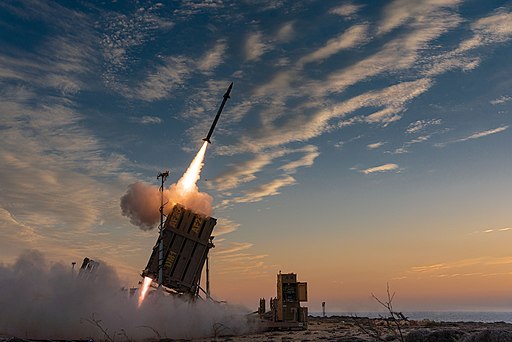On Twitter, Israeli Prime Minister Naftali Bennett announced that the Israeli military has successfully tested its newest laser interception system called the “Iron Beam”. According to the Prime Minister, this new invention is the world’s first energy-based weapon that uses a laser to shoot down incoming rockets, missiles, drones, mortars, and numerous other projectiles. The unveiling of Israel’s newest weapons system is good news for the safety and security of Israel, given the ever-increasing terrorist activities from Iran and its terrorist proxies Hamas and Hezbollah.
According to Brigadier General Yaniv Rotem, head of the Israeli Defense Ministry’s Research and Development team, the Iron beam went through various tests in challenging ranges and timings, making the laser a gamer changer and economically viable. Israeli Defense officials stressed that the purpose of the Iron Beam is not to replace the already known Iron Dome but accompany it and other aerial defense systems.
The Iron Dome has been one of Israel’s significant military successes, with a ninety percent interception rate against incoming projectiles. However, Israeli officials believe that the system is expensive to deploy because of the tens of thousands of dollars it takes to upgrade, fix, and reequip the missile defense system. The video posted by Prime Minister Bennett on Twitter showed the system’s successful interception of rockets, mortars, and unmanned aerial vehicles. In the actual footage of the video, the Israeli military launched an unmanned aerial vehicle (UAV) in the air, then fired the laser beam out of a ground station, where it hit the target and smashed it into small pieces.
While little information is known about the effectiveness of the Iron Beam, the new weapons system will be deployed on land, sea, and air around Israel’s borders in the next decade to protect the country against terrorist attacks. According to the Defense ministry, millions of shekels were poured into this new interception system for the final development and trial stages. The Defense Ministry plans on deploying the new weapons system on the border with the Gaza Strip.
According to Israeli Defense Ministry officials, the Iron Beam’s limited range makes the new system ineffective against long-range targets. However, in the coming months, the research and development team will continue to improve its latest interception system against short-range threats and counter saturation strikes.
The announcement by the Israeli government sent a warning message to terrorist organizations like Hamas in the Gaza Strip, Hezbollah in Southern Lebanon, and the Islamic Republic of Iran, which is increasing their paramilitaries and preparing to attack the Jewish State. In the past months and years, Iran’s Revolutionary Guards Corps (IRGC) has trained, funded, and provided its proxies with new missiles, rockets, mortars, munitions, guns, and guerrilla strategies against Israeli citizens and military forces.
With the news that Iran and the United States are on the verge of reviving the 2015 nuclear agreement, Prime Minister Bennett and his government are deeply concerned that the economic sanctions relief provided by America and its allies will generate new arms for the IRGC, Hamas, and Hezbollah. While Bennett and other Israeli officials have tried to persuade the Biden Administration from pursuing an agreement with Iran, the Israeli government understands that it cannot rely on the United States and must buy, create, and upgrade its defense systems against the growing threats.
Instead of reviving the nuclear agreement with Iran, the United States should help alleviate Bennett and his government’s fear of appeasing Iran and focus on working to improve Israel’s military defense systems. So long as the Biden Administration plans on continuing to negotiate with Iran, Israel’s only option is to increase its defensive capabilities against potential attacks that will most likely come in the future.
“The views expressed in this post reflect the views of the author(s) and not UCLA or ASUCLA Communications Board.”

